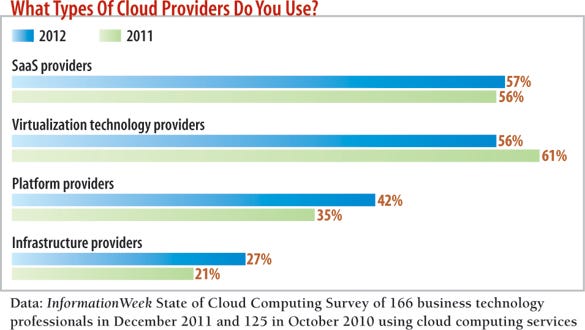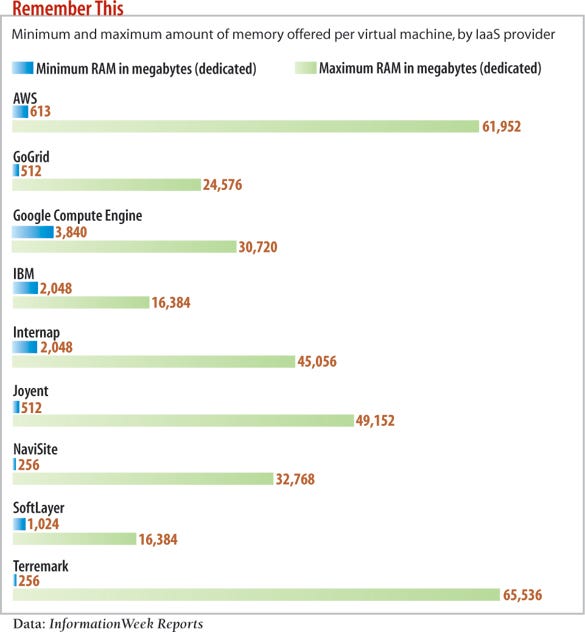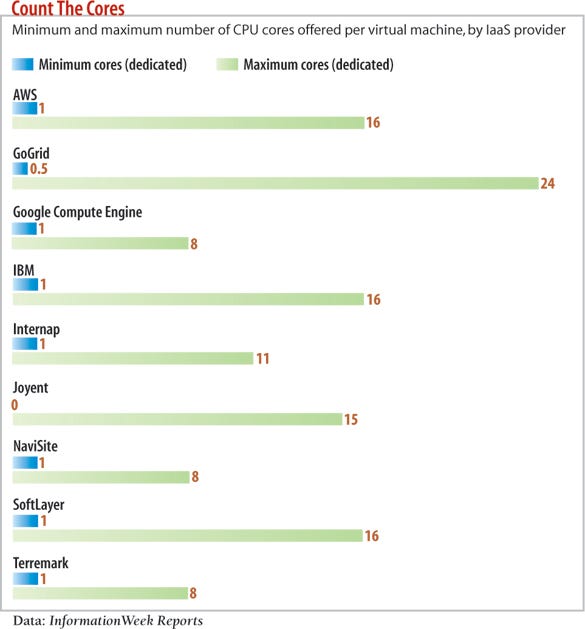Infrastructure-As-A-Service Options
Our latest Buyer's Guide looks at 8 top IaaS offerings in a range of categories.

Infrastructure-as-a-service lets companies focus on their core competencies without having to worry about buying, deploying, and maintaining data center hardware or facilities. IaaS is why Instagram sold at a $1 billion valuation with only 13 employees and why Pinterest served nearly 12 million monthly unique visitors with only 16 employees.
For our new Buyer's Guide, we defined an IaaS provider as offering self-service provisioning of an extremely large number of virtual machines and storage using an API or a Web control panel, without customers having to interact with an engineer or salesperson. For many companies, IaaS offers significant benefits, but with an ever-growing number of providers, it's difficult to know which will be the best choice. To help in the hunt for the perfect IaaS provider, we queried a dozen vendors about their offerings. Eight responded: GoGrid, Google, IBM, Internap, Joyent, NaviSite, SoftLayer, and Terremark. Amazon Web Services didn't respond, but given that it's a major IaaS player, we found answers to our questions on its website. We compared providers in several categories; get the full results at informationweek.com/ reports/iaasguide.
CPU And Memory
Most vendors offer a variety of VMs based on the number of CPU cores, amount of RAM, and amount of local storage that comes with each VM. There are lots of options, from half a core (GoGrid) to 24 cores (also GoGrid), and 256 MB of RAM (Terremark) to 68.4 GB of RAM (Amazon). However, because virtualization does not lend itself to exact CPU definitions, some IaaS vendors have created their own nomenclature for how much processing power comes with each core on a particular VM. Amazon defines an "Elastic Compute Unit," or ECU, as "the equivalent CPU capacity of a 1.0-1.2 GHz 2007 Opteron or 2007 Xeon processor." Google uses a "Google Compute Engine Unit," or GQ, describing 2.75 GQs as "the minimum power of one logical core (a hardware hyper-thread) on our Sandy Bridge platform."
 Computing Resources on Demand
Computing Resources on Demand
Get the Infrastructure-As-A Service Buyer's Guide free with registration.
This report includes :
Information on redundancy and data center IaaS offerings
A companion spreadsheet of vendor responses to our survey
Regardless of how a vendor defines its processing power, you should run benchmarks to see how its offering compares with your hardware.
Storage
Vendors typically offer up to three types of storage: local storage as part of the VM, also called "ephemeral" or "instance" storage, as it disappears when the VM is terminated; block storage that exists and is billed separately from the VM; and a storage service that has virtually unlimited available space and is billed by the space used.
There are two benefits to true block storage that's divorced from the VM. One is that block storage makes VM offerings more flexible: Some IaaS vendors only offer CPU, RAM, and storage in lockstep multiples, such as 1 CPU, 1 GB RAM, and 100 GB storage. If your application doesn't have significant RAM or CPU requirements but requires hundreds of gigabytes or terabytes of disk space, having a block storage option will let you avoid overpaying for a beefier machine.
The second benefit is that block offerings often can take snapshots and restore backups to new volumes very quickly. This is important if you need to restore service fast after an outage and have more than 50 GB of data that must be transferred to a new VM.

Operating System And Databases
The most common operating systems IaaS vendors support are Ubuntu, CentOS, and Red Hat Enterprise Linux, as well as Windows Server 2003 and 2008. In general, supporting tools and libraries for automation and orchestration tend to be implemented for Linux before Windows, but it's far more common to see extensive Windows deployments on IaaS now than a few years ago.
Some IaaS vendors offer specialized VMs that come with both operating system and database server installed and include simple API-driven methods for backing up and restoring data to and from the database server. These can be very useful for quickly implementing an application in the cloud without having to spend a lot of time on software installation, configuration, and orchestration.
The downside to these services is that you pay for convenience--they're more expensive than running the exact same software on the exact same hardware on the IaaS provider's systems. They also limit your ability to fine-tune some or all configuration options.
You may find a cloud management or configuration management software or service that has database templates built for your IaaS vendor to be a better and less costly option. For example, RightScale offers a Database Manager ServerTemplate that provides a similar feature set to Amazon RDS but lets customers run database deployments across multiple clouds and doesn't have Amazon RDS's hourly price premium. Cloud management platform enStratus is working on a library of Chef and Puppet scripts that will enable similar functionality.
Cost
The utility pricing that most IaaS vendors offer can seem very low, but like a cellphone bill, lots of little charges can add up. PlanForCloud .com is a useful resource for cost planning, letting you design a complete cloud architecture and compare costs among IaaS providers.
The most important part of estimating costs is making sure you're comparing apples to apples. Most providers have a one-core, 1- to 2-GB RAM virtual machine available for between 8 cents and 10 cents per hour with on-demand pricing. If you can take advantage of a provider's discount plan (commit to purchase a certain amount of computing resources or pay a lump sum up front to obtain lower hourly pricing for one or more years), you'll see significant savings--up to and beyond 40% with Amazon and Terremark.

Security And Compliance
Let's face it, the default security stances of most IaaS vendors are significantly more stringent than standard on-premises security practices.
IaaS vendors are also quite used to questions about compliance with common regulations, such as PCI DSS, HIPAA, and Gramm-Leach-Bliley, and some have guides on how to best achieve compliance within their infrastructures. Finally, the Cloud Security Alliance's Security, Trust, and Assurance Registry has responses from many IaaS vendors to a rich set of uniform questions about security practices.
Support And SLA
Every IaaS vendor we surveyed offers 24/7 online support, and most have telephone support as well, sometimes at an additional charge. However, not all telephone support is equal; SoftLayer is the only vendor that says it puts you in touch with a person who works directly on the hardware underlying your VM. Make sure to calculate the cost of premium support for vendors that price support as a percentage of usage, as that can quickly add up.
Every IaaS vendor with a service-level agreement provides credits for future service in the case of an outage, although offerings can be difficult to compare. Amazon and SoftLayer offer 10% of your monthly bill as credit in case of an outage, while Joyent offers 5% of your monthly bill as credit for every 30 minutes of outage, and GoGrid offers 10,000% credit on whatever amount you paid during the outage. Most customers find that IaaS SLAs are noncompensatory; that is, no SLA adequately compensates a company for downtime. SLAs serve more as an incentive to providers to make sure the service is up for the vast majority of its customers. If you have a mission-critical application on IaaS, you must have a multiregion or multicloud deployment, as SLAs don't provide adequate protection.
Additional Services
One of the most exciting aspects of infrastructure-as-a-service vendors is that they're constantly innovating and creating new services that make developing and deploying powerful applications even easier. Amazon has had such a head start that its additional offerings dwarf the competition, but a number of vendors are starting to add services, too.
Some of the offerings unique to Amazon are Route 53 (DNS service), ElastiCache (caching service), CloudSearch (full-text search service), Simple Notification Service, and Mechanical Turk (human worker service). A number of vendors offer or will soon offer NoSQL database services, aimed at customers who need to store a large number of key-indexed records, such as user preferences for a consumer website: Amazon (SimpleDB and DynamoDB), Google (BigQuery), and IBM (coming soon); as well as queue services (Amazon, Joyent and SoftLayer); and email services (Amazon and SoftLayer). Some vendors also offer consulting services, whereas others let partners do the consulting.

About the Author(s)
You May Also Like







